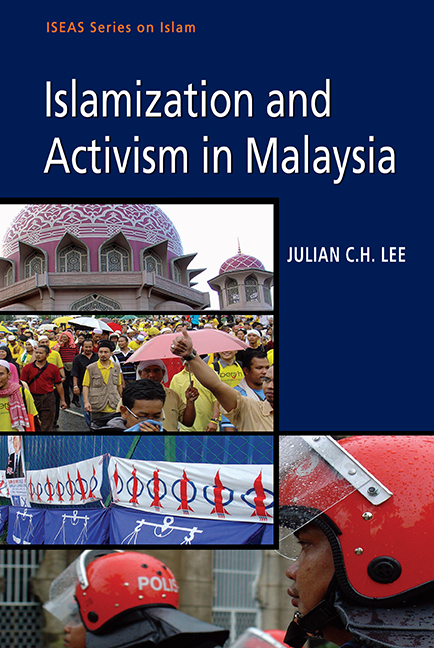Book contents
- Frontmatter
- Dedication
- Contents
- Acknowledgements
- Abbreviations
- Introduction
- 1 On Islam, Democracy, and Activism
- 2 A Short History of Malaysia
- 3 Malaysia as an Islamic State: The Debate
- 4 Conflict of Jurisdiction: Civil versus Syariah Law
- 5 Islamist Lawyers’ Views
- 6 Social Activism and the Article 11 Coalition
- 7 Questioning Orthodoxies, Criticizing Zealotry
- 8 Electoral Engagements
- Conclusion: Islam, Democracy, and Activism in Malaysia
- Bibliography
- Index
- About the Author
- Plate section
6 - Social Activism and the Article 11 Coalition
Published online by Cambridge University Press: 21 October 2015
- Frontmatter
- Dedication
- Contents
- Acknowledgements
- Abbreviations
- Introduction
- 1 On Islam, Democracy, and Activism
- 2 A Short History of Malaysia
- 3 Malaysia as an Islamic State: The Debate
- 4 Conflict of Jurisdiction: Civil versus Syariah Law
- 5 Islamist Lawyers’ Views
- 6 Social Activism and the Article 11 Coalition
- 7 Questioning Orthodoxies, Criticizing Zealotry
- 8 Electoral Engagements
- Conclusion: Islam, Democracy, and Activism in Malaysia
- Bibliography
- Index
- About the Author
- Plate section
Summary
At the end of the previous chapter, some of the limitations for liberal constitutionalists of wholly legal approaches were recognized. In this chapter I examine an example of social activism in response to the failure of legal challenges to Islamically founded restrictions on freedom of religion. I begin by describing the formation of a coalition of lawyers and activists called Article 11. I then indicate the efficacy of extralegal activism by briefly describing a particular case on which they focussed public attention.
ARTICLE 11
On 26 June 2004, a coalition of more than ten NGOs conducted a day-long public forum in the auditorium of the Malaysian Bar Council. This coalition was named Article 11 after the article in the Constitution that articulates freedom of religion. The forum drew an audience of some two hundred people made up of lawyers, interested lay people, and social activists.
Article 11 coalition members had been concerned with the erosion of constitutionally enshrined fundamental liberties. This erosion is the result of the increase in the social and political legitimacy of Islam. The influence of Islam in civil law and the deference of the civil courts to the Syariah courts on some matters has adversely affected the rights of those who belong to religions other than Islam, of those who are Muslim but do not wish to follow State sanctioned interpretations of Islam, and, as we shall see, also of women, both Muslim and non-Muslim. The coalition was formed to organize social and political activism when lawyers and activists realized that the erosion of liberties brought about by Islamization was not a problem that could be remedied by action within the courtroom alone. It was a socio-political problem that could only be countervailed if accompanied by socio-political engagement. As put by Malik Imtiaz Sarwar, who spoke at this forum,
There is no benefit to be gained now … in waiting for some magic miracle to occur in the courts. … The courts are merely, in their minds, correctly reflecting political will as they understand it. … I think the issue is not a legal one at all. It is a socio-political consideration.
Article 11 is composed of various NGOs, only some of which have religious orientations.
- Type
- Chapter
- Information
- Islamization and Activism in Malaysia , pp. 83 - 97Publisher: ISEAS–Yusof Ishak InstitutePrint publication year: 2010

